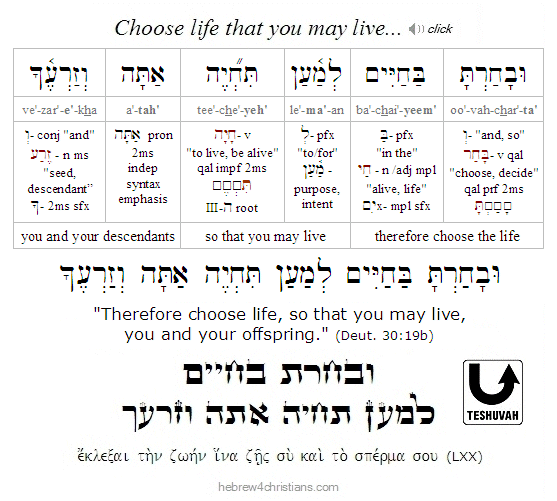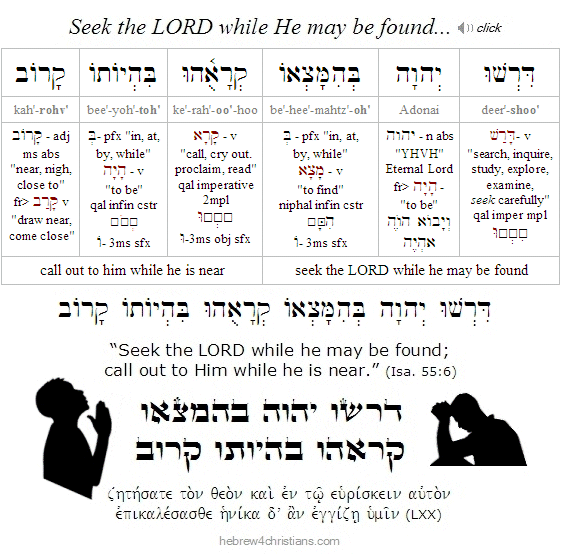|
Our Torah portion begins, "See (רְאֵה), I give before you today a blessing and a curse: the blessing (הַבְּרָכָה), if you obey the commandments of the LORD your God, which I command you today, and the curse (הַקְּלָלָה), if you do not obey the commandments of the LORD your God, but turn aside from the way that I am commanding you today, to go after other gods that you have not known" (Deut. 11:26-28).
We obtain God's blessing (i.e., berakhah: בְּרָכָה) when we obey Him, and our decision to obey manifests the blessed state of walking before the Divine Presence (the direct object marker et (את) before the word "the blessing" alludes to the blessings from "Aleph to Tav," that is from Yeshua, as described in Lev. 26:3-13). As King David said, "I have set (שִׁוִּיתִי) the LORD always before me..." (Psalm 16:8). David made a choice to "set" the LORD before his eyes, for he understood that opening his eyes to Reality was the only path of real blessing. On the other hand, we obtain God's curse (i.e., kelalah: קְלָלָה) when we close our eyes and "forget" that the LORD is always present.... Suppressing God's truth invariably leads to idolatry, that is, to self exaltation. Note that the root word for the word "curse" (kalal) means to be treated as of little account, and therefore essentially "ratifies" the rebellious heart's attitude toward God. This is middah keneged middah - we are ignored by the LORD as we ignore Him, just as we seen by Him when we truly seek His face (Isa. 55:6-7). So we see that the blessing or the curse really comes from our own inward decision, and God establishes the path we have chosen. As King David said, "God supports my lot" (Psalm 16:5), and Solomon wrote, "The heart of man plans his way, but the LORD directs his steps" (Prov. 16:9).
But if obedience leads to blessing, why do the wicked sometimes prosper? Why do the people of power and influence in this world invariably mock God and His truth? After all, the "kings of the earth set themselves, and the rulers take counsel together, against the LORD and against his Messiah" (Psalm 2:2). In this connection it must be said that the choice to live in godliness was not intended to be trivial or obvious. In this life, the wicked may prosper while the righteous may suffer, but this is in order to refine the righteous as they walk by faith (Deut. 8:16). The Torah states, however, that if you obey, there is only blessing, whereas if you disobey, there is only curse - appearances to the contrary notwithstanding (Deut. 11:26). For the righteous it is always: Gam Zu L'Tovah - "this, too, is for the good" (Rom. 8:28). Therefore, as Moses later will appeal in his discourse to Israel, we are admonished to "choose life" that we might live:
הַעִידתִי בָכֶם הַיּוֹם אֶת־הַשָּׁמַיִם וְאֶת־הָאָרֶץ
הַחַיִּים וְהַמָּוֶת נָתַתִּי לְפָנֶיךָ
הַבְּרָכָה וְהַקְּלָלָה
וּבָחַרְתָּ בַּחַיִּים לְמַעַן תִּחְיֶה אַתָּה וְזַרְעֶךָ
ha·ee·doh·tee bah·khem hai·yohm et-hah-shah·ma'·yeem ve'et-hah·ah'·retz
ha·chai·yeem ve·ha·mah'·vet nah·ta·tee le·fah·ney'·kha
ha·be·rah·khah ve·ha·ke·lah·lah
oo·vah·char·ta ba·chai·yeeem le·ma'·an tee·che·yeh a·tah ve·zar·e'·kha

"I call heaven and earth to witness against you today, that
I have set before you life and death, blessing and curse.
Therefore choose life, that you and your offspring may live"
(Deut. 30:19)

 |
The choice is ours - and ours alone - to make. "See, I am setting before you today a blessing and a curse..." Note that the expression "before you" (לִפְנֵיכֶם) implies that people have choice and free will (bechirah chofshit). Belief in free will coheres with the revelation of God's righteousness, since punishment is fitting only when a person has a genuine choice between doing right and wrong. As Abraham said, "Shall not the Judge of all the earth do what is just?" (Gen. 18:25). Likewise the idea of reward is meaningless if God simply decreed who was to be saintly and who was not. Indeed, the validity of moral choice is implied in the imperatives found in Scripture – "ought implies can." As Yeshua said, "Repent (i.e., shuv: turn to God) - and believe the good news" (Mark 1:15; Rev. 2:5).
Free will is paradoxical in light of God's sovereignty, of course, though the paradox itself is no reason to negate its truth. Most people want to choose either horn of this dilemma (e.g., consider the Calvinism/Arminianism theological controversy), but the truth is that salvation is both about God's sovereignty and your responsibility: "Work out (κατεργάζεσθε) your own salvation with fear and trembling, for it is God who works in you (θεὸς γάρ ἐστιν ὁ ἐνεργῶν ἐν ὑμῖν), both to will and to work for his good pleasure" (Phil. 2:12-13). As we believe, so we are given the means to please our LORD and obey His will. Remember who said, "Behold, I am coming soon, bringing my recompense with me, to repay everyone for what he has done" (Rev. 22:12).
But be encouraged, chaverim. We are promised great help as we obey the message of Yeshua and walk by faith in God's unfailing love.... Those who are in relationship with the LORD through Yeshua are given the Holy Spirit (רוּחַ הַקּדֶשׁ) in the role of Comforter (παρακλητος), who gives us strength to persevere in the midst of the storms of this life (John 14:26; 15:26). Nonetheless, the central commandment remains: We must continually choose to trust in God's love and grace for our lives, every step of the way. God will never leave you nor forsake you (לא יַרְפְּךָ וְלא יַעַזְבֶךָּ), but He continues to say to those who trust in Him: "Behold, I have stood at the door and knocked. If anyone hears my voice and opens the door, I will come in to him and eat with him, and he with me" (Rev. 3:20).
Hebrew Lesson
Isaiah 55:6 Hebrew reading (click):
 |
|





